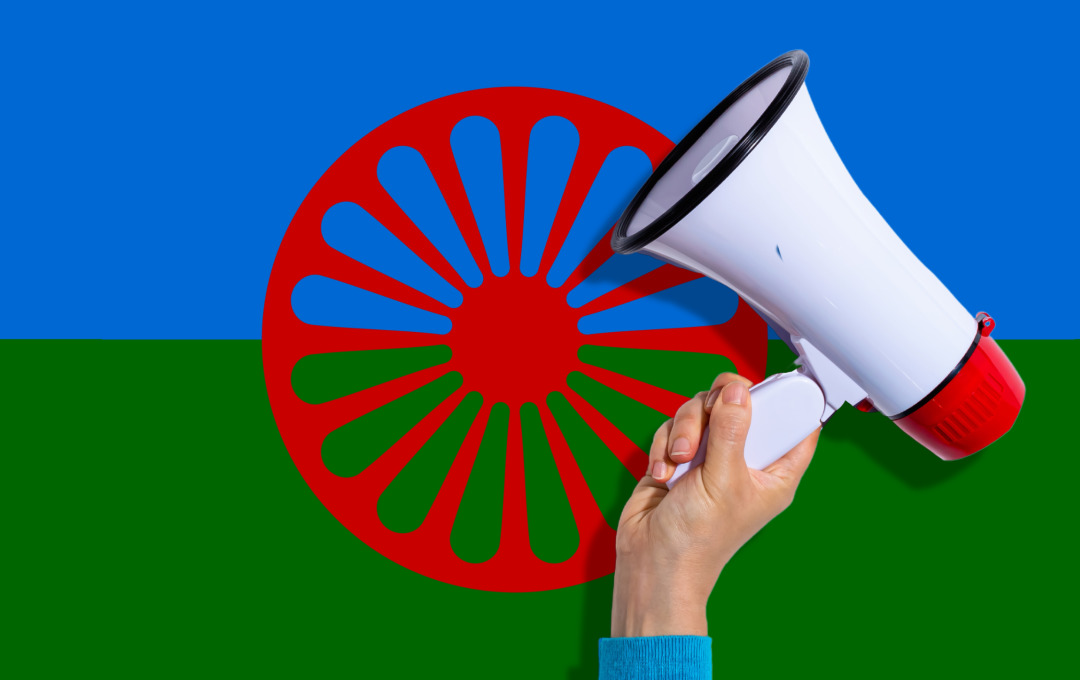GRT History Month: Finding my Voice

Michelle Foy, a spokesperson and activist for the Gypsy/Traveller community, shares her journey of speaking at the Scottish Parliament, standing up to racism and building confidence and trust.
June is Gypsy, Roma & Traveller History Month (GRT History Month). Michelle Lloyd, our Director of Services, spent many years working with the Gypsy/Traveller community in Scotland and Europe. When she said she was leaving to join Cyrenians, and explained our Mission to support people excluded from family, home, work or community on their life journey, her Gypsy/Traveller colleagues and friends were quick to say ‘and which bit of that do we not fit into to?’.
That exclusion was laid bare in yet another report published at the end of May when an expert human rights group from the Council of Europe described “troublingly persistent” levels of discrimination against Gypsy, Roma and Travellers (GRT) in the UK and “shocking” amounts of bullying in the education system, prejudiced reporting in the media and threats to their legal status and rights.
This week Michelle chatted to Michelle Foy, a Gypsy/Traveller activist from Lanarkshire about the importance of participation, trust and relationship-based ways of working. Michelle Foy started by describing how, and why, she felt the need to ‘find her voice’.
For years we’d hide who we were, as Gypsy/Travellers you learned to do that at a young age, for fear of being judged just because of our culture and who we were. Back then if I had issues I didn’t know who to turn to, just accepted it, I knew it was wrong but we’d had that kind of treatment for hundreds of years. Lots of suicides too, people just feeling helpless and lost. I was in England a lot then.
Then we shifted to Scotland and I met yourselves, people who really got to know us and listened. The way of working, and support I received, built the trust and I didn’t feel judged. When I first got involved and was asked to share my ‘lived experience’, I was shy, had no confidence, I went along to the meetings but just sat there. Then slowly, through the training and residentials I started to build my confidence. But I always knew I had someone at my back, someone I trusted. The first time at Parliament, I was going to tell them this and that and then I got there, saw the huge big room with microphones and cameras.
I wanted to be heard, to squeal but nothing came out!
But slowly, slowly I built up my confidence and now there’s no stopping me. Enough is enough, this kind of racism shouldn’t still be happening. Our history and culture are not recognised enough and that’s not fair. That’s why GRT History Month is so important. If you can educate people in the schools, from a very young age, and the authorities, then it should be better for everyone. I didn’t get much schooling, neither did my kids but I am hoping the new generation doesn’t have to put up with what we did. We’re not asking for anything special, just a life free from bullying and racism, a bit of respect and not to be judged.
The more I did find my voice, the more I wanted to do. Sometimes I would try out questions, what I wanted to say, check in beforehand like, and that was so important. In the meetings at Parliament, for example, I started to notice people were really listening, that was a kind of acceptance, there was a shift.
We were in control and, after so many years of being judged, that felt good. But it takes time and you need the relationship of trust first.
Years ago I wouldn’t challenge anything, or I’d get angry, but now I am calm and take a different approach, being assertive and just standing up for myself and my community. I learned that and I learned it over time, with trusted people around me. I learned that my voice was powerful. When you’re speaking to those in authority, you can see the change.
One thing I really like, and years ago I would’ve laughed at the very thought of it, is using Forum Theatre. We act out real life situations and it takes you back, you feel the emotion because it’s real, it happened, you lived it. You can see the impact that has on those watching and it is a great way to share lived experience, whatever that is – whether its you’ve had mental health issues, or been in jail, or been bullied, maybe had a drugs problem, or been homeless – all those things where people judge you. When you have a feeling of non-acceptance it’s hard to speak out, it’s hard feeling constantly judged and not able to participate. But with Forum Theatre you can see the impact in their faces, it’s really empowering, I think people grasp it quicker, as they say ‘actions speak louder than words’.
GRT History Month gives us a platform and a space that you often don’t get. But to use that space you need confidence and trust.